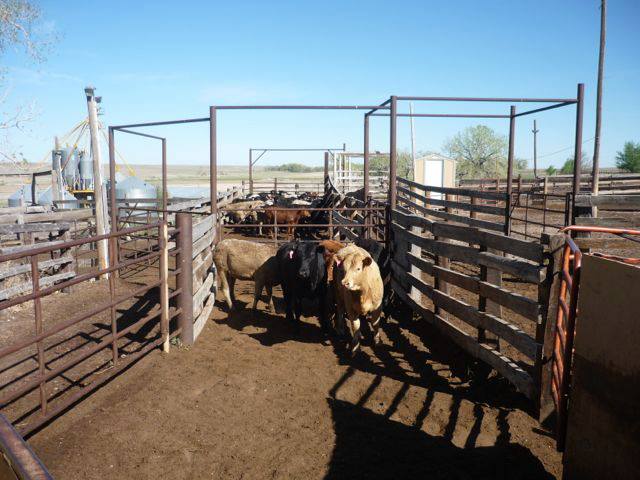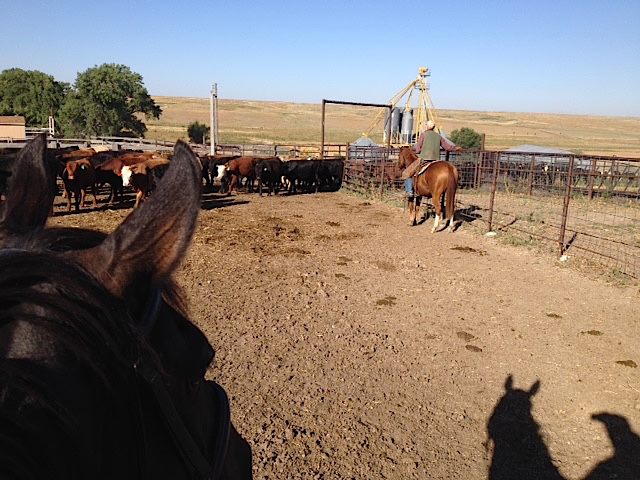Effective Approaches in Ranch Management
Founded in 2008, Round River Resource Management, LLC provides professional management and consulting services to land and livestock owners and is dedicated to the management of ranches and their natural resources for long-term economic and ecological sustainability.
 In 2008 Round River, was selected by the Colorado State Land Board and The Nature Conservancy to lease and manage operations on the 50,000 acre Brett Gray Ranch owned by the Colorado State Land Board located near Rush, CO. The Brett Gray Ranch is a unique property on the eastern plains of Colorado with the headwaters of the Steels Fork Creek flowing through the middle of the ranch. Abundant seeps and springs are located along the creek, and with numerous playas located on the uplands, this ranch is latent with opportunities to improve the four ecosystem processes and enhance the biodiversity of the plant and wildlife species. In collaboration with the Land Board and The Nature Conservancy, Round River was commissioned with a three-part goal to maintain a productive and sustainable ranching operation, encourage science and stewardship that maintains biodiversity and a sustainable prairie ecosystem, and to support education and community outreach to appreciate and support effective conservation of prairie ecosystems through responsible ranching.
In 2008 Round River, was selected by the Colorado State Land Board and The Nature Conservancy to lease and manage operations on the 50,000 acre Brett Gray Ranch owned by the Colorado State Land Board located near Rush, CO. The Brett Gray Ranch is a unique property on the eastern plains of Colorado with the headwaters of the Steels Fork Creek flowing through the middle of the ranch. Abundant seeps and springs are located along the creek, and with numerous playas located on the uplands, this ranch is latent with opportunities to improve the four ecosystem processes and enhance the biodiversity of the plant and wildlife species. In collaboration with the Land Board and The Nature Conservancy, Round River was commissioned with a three-part goal to maintain a productive and sustainable ranching operation, encourage science and stewardship that maintains biodiversity and a sustainable prairie ecosystem, and to support education and community outreach to appreciate and support effective conservation of prairie ecosystems through responsible ranching.
To achieve these goals, Round River implemented a management plan designed to enhance the ecosystem processes – mineral cycle, water cycle, solar energy, and community dynamics. This includes developing a pipeline and livestock water system that reduced dependence on the stream and riparian areas, a planned rotational grazing system that has increased stock density, reduced grazing duration to less than four days/period and a rest/recovery period averaging 360 days or more.
During the eight years of operations this grazing system helped to improve the four ecosystem processes by adding more organic matter to the soil, building a stronger root system, providing better water capture and infiltration, stronger more vigorous plants that capture more solar energy, increase the biodiversity of the plant and animal community and helped to protect sensitive riparian areas from degradation and erosion.
These improvements have been achieved during some of the most severe drought conditions on record and have been documented through an intensive monitoring process conducted by Round River, the State Land Board and The Nature Conservancy.
In addition, Round River utilizes wildlife friendly, single wire permanent and temporary electric fencing to control grazing, protect sensitive areas, and time of grazing in critical locations to protect animal habitats and bird nesting sites. Calving seasons have been adjusted to calve in harmony with nature and provide a predator friendly environment. Water systems have been developed to improve grazing distribution and grazing in riparian areas is limited to days if not hours, resulting in protection of stream banks, widening of the stream channel, increased plant biodiversity, and increased capture of sediment.
 In December of 2014, Round River assumed management of the 25,000 acre Lyme BX Ranch and is collaborating with the land owner, The Nature Conservancy, the Savory Institute and the Palmer Land Trust to develop and implement a management plan designed to improve the ecosystem processes, protect the resources, and achieve the economic and ecological outcomes desired by its partners. To accomplish these goals, we implemented a dormant season rotational grazing system, and have initiated an infrastructure development plan designed to improve operations. The first phase has begun with a water development plan designed to provide adequate storage and supply the water required for a large herd in a rotational grazing system. The next step will include a fencing plan that will allow for increased stock density and herd effect, shorter grazing periods and improved recovery periods further enhancing the four ecosystem processes.
In December of 2014, Round River assumed management of the 25,000 acre Lyme BX Ranch and is collaborating with the land owner, The Nature Conservancy, the Savory Institute and the Palmer Land Trust to develop and implement a management plan designed to improve the ecosystem processes, protect the resources, and achieve the economic and ecological outcomes desired by its partners. To accomplish these goals, we implemented a dormant season rotational grazing system, and have initiated an infrastructure development plan designed to improve operations. The first phase has begun with a water development plan designed to provide adequate storage and supply the water required for a large herd in a rotational grazing system. The next step will include a fencing plan that will allow for increased stock density and herd effect, shorter grazing periods and improved recovery periods further enhancing the four ecosystem processes.
Round River uses livestock as a management tool to improve the land resource base and benefits livestock owners by managing livestock and providing grazing opportunities to reduce their overhead production cost increasing profitability. Annually, Round River oversees the management and grazing of 600-900 cow-calf units and 2000-3000 head of yearlings in a five-month summer grazing program dependent upon weather and forage conditions.
